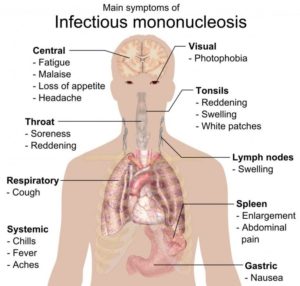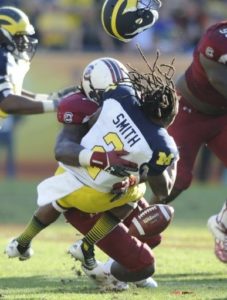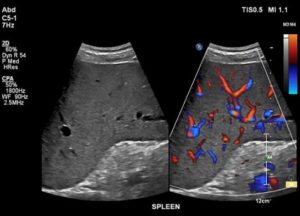Infectious Mononucleosis, also known as Mono
How did I get it?
A very common scenario we see at Ellenton Family Practice Direct is a young high school or college age athlete that comes in thinking they have strep throat, and they leave the office with a diagnosis of infectious mononucleosis, or mono. Also called the “Kissing Disease,” mono is primarily transmitted by the patient’s saliva (spit). Most of the kids we see at our office have caught mono from sharing drinks with their friends and teammates. The average age to come down with mono is between the ages of 12 and 24.
DON’T SHARE DRINKS or WATERBOTTLES!

Symptoms of Mono
What is Mono, and now what do I do?
This illness is caused 90% of the time called Epstein-Barr virus. The signs and symptoms are usually identical to strep throat. Epstein-Barr is one of many herpes viruses. Common symptoms are fever, intense fatigue, a very sore throat that’s covered in white pus-like exudate, and swollen glands in the neck, to name a few. As most know, there is not much that can be done for an infection caused by a virus. It is the same with mono. Supportive treatment is the only treatment. The primary treatment is REST and FLUIDS, and TIME. The worst symptom is extreme fatigue, and this can last for months. Antibiotics won’t help either; this is a virus.
“Oh No, I’ve got Mono, and I play sports!”

Hard tackle can rattle the spleen
Why can’t I play sports?
The virus attacks a special type of white blood cell, called a lymphocyte. Lymphocytes will increase in number when a virus is attacking the body. The spleen is an organ that is found under the left ribs in the upper abdomen. The spleen’s job is to filter the blood and filter out harmful substances in the blood. The spleen can get overworked with the large increase of the white blood cells, and if this happens, the spleen can swell in size. This doesn’t happen in every patient. The danger is if the spleen is swollen and somehow the athlete gets hit in the abdomen, the spleen can rupture. This can quickly become deadly.
How can I find out if my spleen is in trouble? When can I go back to sports?

The spleen can enlarge
Some athletes get left upper abdominal pain which lets them know their spleen is inflamed. Most people don’t get this symptom, so how do you know if it is dangerous to play sports? Enter the ultrasound. Ultrasound is a medical test that can “see” into the belly and tell if the spleen is indeed swollen. What doctors can do is order an ultrasound test at the time of diagnosis and at certain intervals to see if it safe to go back to playing contact sports. There is an argument in the medical community about how long athletes should sit out of their games, with estimates that can vary from 2 weeks to 6 months. At Ellenton Family Practice Direct, we usually will recommend 4-6 weeks, but with ultrasound we can be more precise.
The following link is a study of the usage of ultrasounds that were used to determine when it was safe to go back to playing sports. To summarize, 84% of athletes were tested by ultrasound and it was determined that after 1 month, they were safe to return to sports. However, 16% of the student athletes had enlarged spleens and it was too dangerous for them to return to play. The good news was that after 2 months after the diagnosis, they were safe to return to sports because their spleens had returned to normal. It was proven that ultrasounds are an excellent way to determine when it’s OK to go back to play. https://www.ncbi.nlm.nih.gov/pubmed/21853428

Spleen ultrasound can determine if spleen is in danger
So, if you’ve been diagnosed with mono, the best thing you can do is rest and drink fluids, and take anti-inflammatory medicines other than aspirin-Never take aspirin if you have a virus. School and your coaches needs to be notified that you may have periods of extreme fatigue where you must go home and sleep. The more you rest, the quicker your body will recover and return to normal. Your coaches also need to be notified that sports can be dangerous while your body is healing. Contact sports are definitely out for at least a month. Even a non-contact sport such as springboard diving can be dangerous. My college roommate at the University of Tennessee ruptured his spleen just by hitting the water wrong, so it’s best to be careful. Talk to your family doctor or pediatrician to see when it’s safe to return to play. Ultrasound testing can be a lifesaver, but since no medical testing is perfect, see your family doctor.
Blog Post by David Hervig, PA-C
